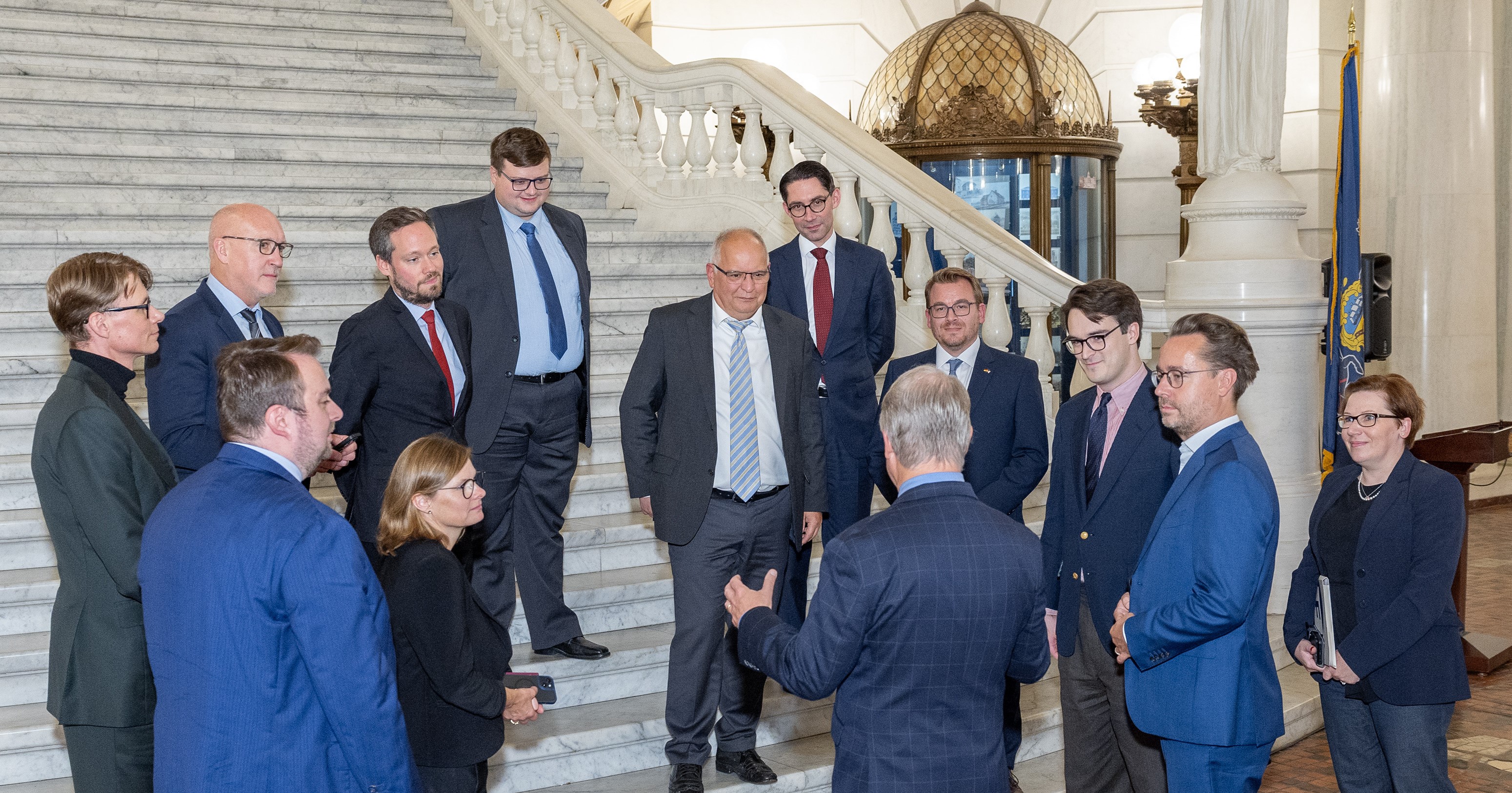Study Tour
U.S. Election 2024: FDP Study Tour

Members of the delegation speak with State Senator David Argall in the Pennsylvania State Capitol
© Office of David G. Argall, Pennsylvania SenateBetween September 28th and October 5th of 2024, 11 state executive directors of the German Free Democratic Party (FDP) travelled to Washington, DC, and Harrisburg, Philadelphia, to gain first-hand insights into political campaigning in the United States.
The first portion of the trip was spent in the nation’s capital. Here, delegation guests got a sense of the basic framework within which American elections take place, including the swing-state-centric Electoral College system and federal campaign finance rules, as well as a nuanced awareness of the major parties’ strengths and positions on the main issues at play. The economy, immigration, and abortion stood out as recurring central motifs; the consensus among the experts in both camps was that whichever campaign managed to operationalize these issues most effectively would have the edge in November. On inflation and the border, Republicans had a messaging and polling advantage; on abortion, Democrats showed a clear lead. Overall, though, most assessments concurred: the race was close to a dead heat.
Especially in such tight races, the importance of data-driven voter outreach was made clear; detailed data on demographics, past political engagements, and even consumer behaviour could help campaigns allocate their finite resources in a way that maximized the bang for their buck. Another point of particular interest to our German delegation was the major parties’ post-2016 realignment. The electoral shifts that were changing the makeup of the parties involved, first and foremost: the flight of big business, affluent and educated voters, and suburban women towards the Democratic party; and Republicans’ gains among blue-collar workers, males overall, and certain portions of the minority vote.
Finally, the delegation also turned its attention to the future of transatlantic relations after the US election in terms of diplomacy, security, and trade. Insights from the public and private sectors revealed deep concern about the potential intensification of isolationism on the American side of the Atlantic, whether expressed as withdrawal from foreign strategic commitments or as economic protectionism.
The second half of the trip took place in Harrisburg, Pennsylvania’s centrally-located capital city. Harrisburg was selected for the trip because of Pennsylvania’s unique status in the presidential election. As a swing state with 19 Electoral College votes, won by Donald Trump in 2016 and Joe Biden in 2020, the way Pennsylvanians cast their ballots in the upcoming election might well determine the outcome of the race. Not only that, but analysts nearly unanimously consider Pennsylvania to be an indicator for how the other “blue wall” states (Michigan and Wisconsin) will vote. If Kamala Harris is to win on November 5th, she cannot afford to lose these Democratic redoubts.
A formerly booming industrial state, Pennsylvania has lost a majority of its manufacturing and mining jobs in a process of deindustrialization that has left many towns and communities economically and culturally devastated. Conversations with state senators, strategists, and industry spokespeople indicated that these hardships and the search for ways out of them — including investments in tech and manufacturing, but most importantly betting on the state’s energy sector — would be determinant factors for the swing state’s politics in the foreseeable future. In these and other senses — with economic concerns about industry and energy at the forefront and a party shift in the making — Pennsylvania acts as a microcosm of the United States at large.
The practical aspects of campaigning stood at the forefront during the delegation’s stay in Harrisburg. For the FDP executives — themselves facing the challenge of mounting their re-election challenge in Germany next year — it was particularly instructive to learn how parties run their campaigns, from the macro to the micro levels. Attention was paid to the selection of candidates, the importance of their ties to their communities, and their willingness to engage personally with voters in outreach efforts; the role of fundraising and the resources and strategies devoted to financial efforts; the organization of canvassers and volunteers, from recruitment of party supporters to the designation of local “captains”; the strategic use of campaign messaging, the comparative advantages of different mediums, and the prioritization of highest-return messaging strategies; and of course, parties’ efforts to secure favourable districting in the state.
Overall, delegation participants came away with a far more nuanced understanding of the main concerns driving contemporary American politics, a balanced sense for both Democratic and Republican values and strategies, and a first-hand appreciation for the intricacies of both the presidential race and election campaigning in general. Beyond this, they not only learned how campaigns are run in the United States, but were able to gain valuable takeaways for their own electioneering work. Regular, lively conversations among the participants — whether over the dinner table or at roundtable discussions — prompted detail-oriented reflection on how to take the lessons learned and implement them at home.
